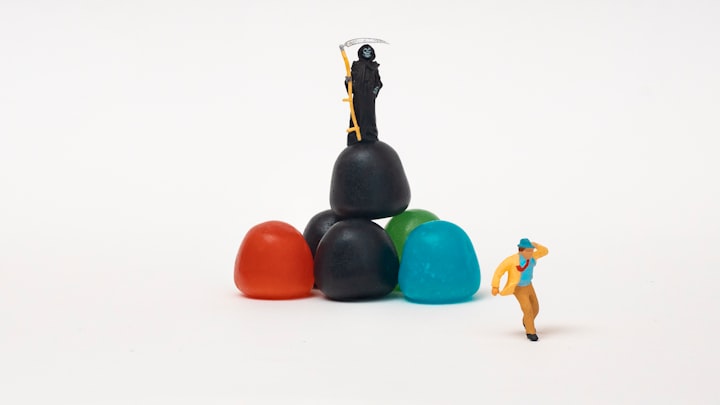Our Generous Benefits Include Mental Health Interventions
I took one step to the right, but she took one step to the left, her left, my right, and there we were again, and we laughed a little, yes we did, a little quiet laugh: how silly are we.

By Mike Barthel
I was walking down the hallway at work, not paying attention, because I'd gotten some news, and it wasn't good news, so I had to find one of those little isolation booths they have in offices now to make your personal phone calls, because you can't disturb the other people at your long table full of computer monitors, nor can you take up valuable meeting room space; they would post about you on Slack, no pictures, but an unmistakable allusion: Goody Proctor destroyed my 45 minute focus block with her crying. And so forth.
I was distracted, my eyes fixed on the authentic concrete flooring, which said: we weren't doing computer work here, we weren't mere typists, we were building something, creating objects. This was a shop floor, this was a factory, we were makers. And so—and so—when I saw a pair of scuffed white shoes before me and realized how close I was to this other person, I looked up and made a noise like "Whup."
And she smiled at me, in her strange blue jumpsuit, and I smiled back at her in my typist's uniform, and said "Sorry," and I took one step to the right, but she took one step to the left, her left, my right, and there we were again, and we laughed a little, yes we did, a little quiet laugh: how silly are we.
And so I stepped to the left, my left, her right, but she stepped to her right at the same time, and there we were! Still blocked, in this narrow section of the hallway, no more than four feet wide, a water fountain on my left and a trash can just behind her. How silly! How absurd.
And I looked into her eyes then, and I saw something like…determination?Resolve? But that was a crazy thing to see. So I laughed again, and I said "excuse me," and I extended my right arm towards the wall, to indicate that I would go that way, like I was doing a maitre d' right this way sir to myself, but as I slid diagonally across the hallway, making constant but kindly eye contact, her look changed to one of aggression, and she slid over too, blocking me a third time. One time too many for a mere awkward accident. Plus she cocked an eyebrow.
If it was a game, then let it be a game, a silly little game. I pulled a head fake back to the left, then snapped back to the right, trying to step over her left ankle, but she slammed her hand into the wall, forming a barrier.
I stopped, calmed myself, had a drink from the fountain, taking my time, saying "Ah!" and so forth. Then, suddenly, I drove towards the left wall, bounced off it toward the right, bounced off that too, and used the momentum to slingshot forward. But she took two stutter-steps back and held her hands up, palms out, making it impossible to pass without contact.
I backed off. She was breathing heavily, the determination in her eyes looking strained, sweat spotting her brow.
"Why won't you let me past?" she said, panting.
Ignoring this—this made no sense, I was not blocking her way, she was blocking my way—I scanned the scene, her eyes tracking mine. Could I slip by her with a wall-walk? It felt unlikely for a 45-year-old. I knew not to make bodily contact; that would constitute assault, and that would just mean more bad news. So I decided to test her.
I pressed my body flat, face-first, against the right wall, and slid forward, the rough wallboard exfoliating my winter-dried cheeks. At first, she just put a hand out, but when it became clear that I could slowly nudge that out of the way, she pivoted her body flat against the wall, too, fully stopping my progress. I felt her hip, hidden under the jumpsuit, against my thigh.
She looked at me; frowned. The determination had been replaced with something else.
But I still needed to get past, didn’t I? Didn't I? Yes I did. Though I couldn't remember why.
I spun on my front foot, trying to whip around her, but she mirrored me perfectly, and as her shoulders nestled under the ridge of my shoulder blades, our fingers met and intertwined. The sensation unnerved me, far too intimate for the conflict we were locked in. I pulled mine free and faced her as she met my gaze. How could she tell what I was going to do? How could she read me so well?
I sank to my hands and knees, bowed my head, looking at the hard concrete floor. Surely this abjectness would be so embarrassing, she would turn her head away, she would have no choice but to let me go past. But no: she spread her legs, one against each wall, daring me to slither through. I was stumped. It seemed an impossibly untoward means of egress. So I remained still, and she eventually closed her legs and sank to her hands and knees too, but aggressively, snorting like a bull.
This was my chance. I sprang up, using my long legs to leapfrog over her hunched body. But as I went airborne, she extended her body backwards, arms outstretched, and enclosed my torso firmly, dragging me to the floor. An assault; the body contact had been made, and it had not been my fault, as the security cameras would surely (surely!) reveal. We tumbled together in a heap, knocking over the trash can, coffee cups and loose wrappers going everywhere.
Something in my pocket let out a noise like a small cry. Like a summoning. But what it was summoning me to, I could no longer recall.
I drew the wrappers around me to provide some softness against the cold, authentic concrete floor, and I let myself sink into her embrace.
"Let me go," she said to me, sleepily. "Why won't you let me go."
Mike Barthel is a writer, critic, and researcher living in Washington, D.C. His fiction has been published in The Offing and Fatal Flaw, and he is working on a book about Miley Cyrus' "Party in the U.S.A." He can be found on Twitter/X @michaelbarthel.



